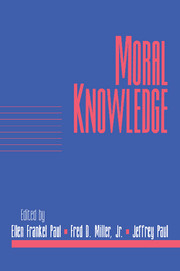Book contents
- Frontmatter
- Contents
- Introduction
- Acknowledgments
- Contributors
- Realist-Expressivism: A Neglected Option for Moral Realism
- Thinking about Cases
- But I Could Be Wrong
- Moral Facts and Best Explanations
- Two Sources of Morality
- “Because I Want It”
- Realism, Naturalism, and Moral Semantics
- Incomplete Routes to Moral Objectivity: Four Variants of Naturalism
- Explanation, Internalism, and Reasons for Action
- Moral Knowledge as Practical Knowledge
- Practical Reason and Moral Psychology in Aristotle and Kant
- Hypothetical Consent in Kantian Constructivism
- Mill's “Proof” of the Principle of Utility: A More than Half-Hearted Defense
- Index
Moral Knowledge as Practical Knowledge
Published online by Cambridge University Press: 04 August 2010
- Frontmatter
- Contents
- Introduction
- Acknowledgments
- Contributors
- Realist-Expressivism: A Neglected Option for Moral Realism
- Thinking about Cases
- But I Could Be Wrong
- Moral Facts and Best Explanations
- Two Sources of Morality
- “Because I Want It”
- Realism, Naturalism, and Moral Semantics
- Incomplete Routes to Moral Objectivity: Four Variants of Naturalism
- Explanation, Internalism, and Reasons for Action
- Moral Knowledge as Practical Knowledge
- Practical Reason and Moral Psychology in Aristotle and Kant
- Hypothetical Consent in Kantian Constructivism
- Mill's “Proof” of the Principle of Utility: A More than Half-Hearted Defense
- Index
Summary
DIFFERENT PERSPECTIVES
In the area of moral epistemology, there is an interesting problem facing the person in my area, ancient philosophy, who hopes to write a historical paper which will engage with our current philosophical concerns. Not only are ancient ethical theories very different in structure and concerns from modern ones (though with the rapid growth of virtue ethics this is becoming less true), but the concerns and emphases of ancient epistemology are very different from those of modern theories of knowledge. Some may think that they are so different that they are useful to our own discussions only by way of contrast. I am more sanguine, but I am quite aware that this essay's contribution to modern debates does not fall within the established modern traditions of discussing moral epistemology.
Because ancient moral epistemology is rather different from modern kinds, two kinds of danger arise when we try to compare them. On the one hand, we may produce a historical account which fails to engage with modern concerns. On the other hand, we can pose a philosophical question in terms of modern assumptions about knowledge, and then find that the ancients’ answer to it appears naive or off the point.
While both can be unhelpful, the second is likely to be more so than the first. In what follows, I shall begin with a passage from a mddern author which displays a dramatic misunderstanding of a famous ancient position. I shall then try to isolate the assumptions which prevent a better understanding.
Information
- Type
- Chapter
- Information
- Moral Knowledge , pp. 236 - 256Publisher: Cambridge University PressPrint publication year: 2001
Accessibility standard: Unknown
Why this information is here
This section outlines the accessibility features of this content - including support for screen readers, full keyboard navigation and high-contrast display options. This may not be relevant for you.Accessibility Information
- 1
- Cited by
